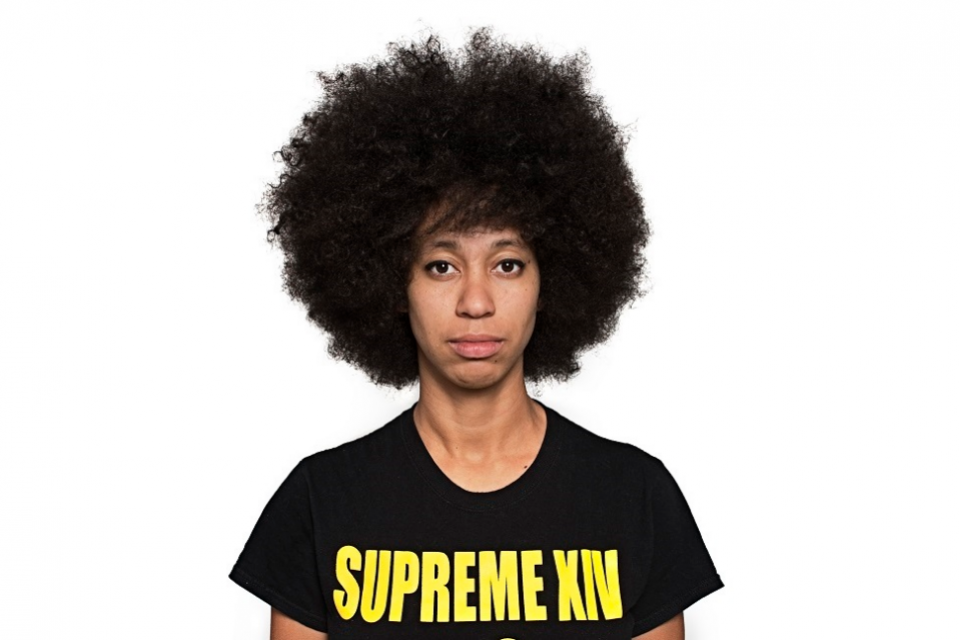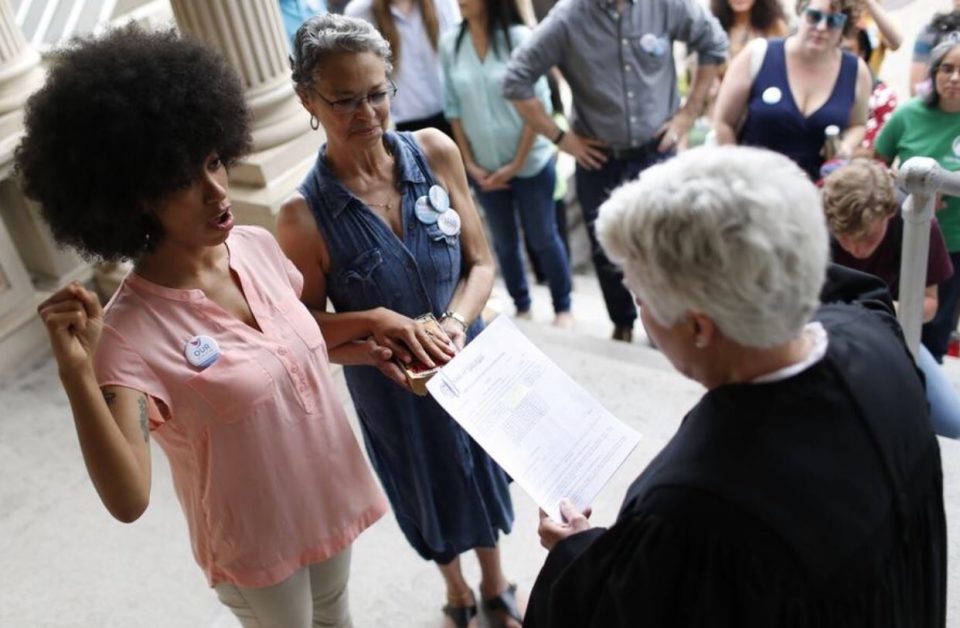
(Raffaella Mezzanzanica)
“As young folks, we have a unique capacity for freedom-dreaming that I think gets beaten out of you as you survive into older years, and we need that creativity and audacity in addressing the very dire consequences of failed public policies of old.”
“I owed it to Hip Hop. Hip Hop saved my life during a time where I was ready to end it all.”
“The revolution must be joyous; we need music to spur us.”
(Mariah Parker – all quotes are taken from the interview below)
Who is Mariah Parker?
Mariah Parker is part of a new wave of young women of color entering politics.
Mariah is also openly queer, a hip hop artist (her stage name is Linqua Franqa), a PhD candidate in linguistics at the University of Georgia, and community organizer dedicated to transformative politics and civic engagement. As County Commissioner, she is focusing on creating economic stability and racial justice as well as criminal justice reform and raising the minimum wage.
At age 26, she was elected Athens-Clarke County Commissioner and she went viral with a video showing her being sworn in as an Athens-Clarke County Commissioner with her hand on a copy of “The Autobiography of Malcolm X” and holding her fist high.
In her album Model Minority, published in February 2018, she addresses important social issues such as drug addiction, race and politics and feminism.

She is currently co-hosting with Dope Knife, Waiting on Reparations, a podcast whose aim is to explain how hip hop and politics connect.
In this interview, Mariah tells about her political struggles as a County Commissioner and an activist, about the importance for young generations of being represented. She also explains how Hip Hop saved her life and how she felt after meeting her personal hero.
Q.: You are both a hip hop artist (Linqua Franqa) but you are also a politician and activist. Were politics/activism and music things which come separately in your life or have they been connected since the very beginning?
M.P.: My music is molded by public policy of various kinds — from restrictive laws that shroud reproductive healthcare in stigma to diversity policies that tokenize minority students to budget austerity that makes mental healthcare difficult to access — so I’d say music and politics are intertwined from the beginning, even if I may not have realized it when writing.
Q.: Starting from music, why did you choose hip hop?
M.P.: I owed it to Hip Hop. Hip Hop saved my life during a time where I was ready to end it all– it showed me a way forward in which telling my stories through music could set me free–and so I gave back to the culture through music of my own.

Q.: You co-host a podcast called “Waiting on Reparations” together with Dope Knife, a rapper and visual artist, where you build and explain the connections between Hip Hop, social issues, political movements and public policy. There are many people out there who strongly believe that “rap is not music” and that “hip hop is not a cultural, social and political movement at the same time”. What’s your answer for these people?
M.P.: As a linguist and Hip Hop education scholar, I can tell you there are thousands upon thousands of pages of scholarship on Hip Hop music, language, and culture that would heartily disagree, and I trust the folks who dedicate their lives to studying Hip Hop as a political and cultural force.
Q.: Music has always had a central role in civil activism and protest movements and not for “entertainment purposes” only. Given the current political and social situation in the US, there has been an increase in the publishing of protest songs recently. What I suspect is that not all these artists did this in order to raise awareness but possibly for economic reasons. Have you ever had the same feeling? If so, do you think it could also be something related to the “easy money” that the entertainment business can grant?
M.P.: I believe Cardi B once commented that she put out a “deep” song and it got very little streams, but then she drops a song like “WAP” and it’s the hottest hit imaginable. So when artists make music in response to our times, I commend that, as it’s really a brave act. I don’t see it as much as capitalizing financially on moments of unrest as a genuine reaction to the moment, ‘cause the money doesn’t really line up behind protest songs, as critical to movement work as they are.
Q.: You are very young and you are an artist and therefore you have a privileged position to talk to your generation and to even younger generations. If you had to publish a new song now, what would you focus on in terms of content?
M.P.: My new music is a lot more civically-explicit; that is to say, I talk a lot about organizing our workplaces, boycotting corporations, marching, running for office, about specific policy prescriptions like defunding the Pentagon or guaranteeing housing and college to all, ‘cause I’ve become acutely aware of how much of our public civics education growing up is simply, “This is how a bill becomes a law. Now go vote!” which leaves us a bit stranded in terms of where we believe our political power lies. So to the youth, who are still being educated that our vote is still our primary means of participating in our political worlds, I’d share what I’ve written lately.
Q.: You have recently been in conversation with Dr. Angela Y. Davis, a woman who has completely devoted her life to activism, to fight for injustice, gender equality and who, in the foreword to her book “Freedom is a constant struggle” has been defined by Cornel West as “one of the few long-distance intellectual freedom fighters in the world”. How was meeting her for the first time and having the opportunity to share your thoughts with her? What did you learn from that particular conversation and from her life as an activist?
M.P.: Meeting my personal hero was frankly terrifying, but she was incredibly humble and curious and her love for youth movements was volcanic, so I felt really heartened by our interaction. Our conversation really rooted me in the need for international solidarity — I knew as much from reading about the relationship between Palestinian occupation and the birth of Black Lives Matter in Ferguson, Missouri in Freedom is a Constant Struggle, but hearing her discuss how the international movement for her freedom from incarceration changed the trajectory of her life– and ultimately the trajectory of Black liberation struggle in the United States — really drove the need for global scope home for me.
Q.: You are part of a new wave of young women of color entering politics. At age 26 you were elected Athens-Clarke County Commissioner. How important is for young generations in general, and for young women in particular, to be represented by people of their age and who share their own beliefs?
M.P.: As young folks, we have a unique capacity for freedom-dreaming that I think gets beaten out of you as you survive into older years, and we need that creativity and audacity in addressing the very dire consequences of failed public policies of old. We’re inheriting a very broken world and it’s only fair that we should decide where it goes from here. Same for women, folks of color, LGBTQ people: for too long people who don’t understand our lived experiences have made decisions on our behalf, and in a representative democracy, it’s only logical that we take charge and decide what’s best for our own people, as a matter of equity and of principle.
Q.: On June 5 2018 you went viral after being sworn in as an Athens-Clarke County Commissioner with your hand on a copy of “The Autobiography of Malcolm X” and holding your fist high. Why are the teachings of personalities like Malcolm X and Martin Luther King still essential for the affirmation of people’s rights as human beings today? And how important have they been in your political path, in being an activist but also in spreading out your messages through your music?
M.P.: It’s so essential that young movement workers study the struggles of those who came before us, to hearten us in our own struggle, to understand strategy and coalition formations, and to realize the unfulfilled dreams that these leaders gave their lives demanding. Malcolm X in particular, and the way he fearlessly moved through the world speaking truth, has very much shaped my approach to writing hard truths in my songs.

Q.: There are only a few days left to what has been defined as “the most important election in the history of the US”. Gloria Steinem, another amazing woman who has devoted her life to activism said: “The voting booth is the one place on Earth where the least powerful and the most powerful are equal” (G. Steinem, “The Truth Will Set You Free, But First It Will Piss You Off! Thoughts on Life, Love, and Rebellion”). What’s your view on this election but, above all, what is/are your highest expectation/s from its outcome?*
M.P.: My highest and lowest expectations look similar: either way we organize, we strike, we boycott, we educate, we fight like hell for the world we deserve. What formation that takes may be different depending on the victor, but the tenacity, the love we must show one another, the grit is the same no matter what.
Q.: We all know what’s recently happened in the US after the murder of George Floyd and the subsequent protests but even before those facts you proposed the approval of the so-called “50/10 Plan” which was basically a plan “to defund the police”. What were the reasons behind it?
M.P.: I am an abolitionist, which means I believe that, by fully investing in beloved communities, we can render police and prisons obsolete. The 50/10 Plan was a step in that direction — it recommended diversifying our approaches to harm in our community to include specialized supports for remedying varied crises without violence. Got a gun to your own head? Call in a therapist. Loud house party next door? Send in unarmed code enforcement officers. Got a broken tailight? Send a traffic patroller to help you fix it real quick. Having a marital dispute? Ring a rapid response relationship counselor. 50/10 acknowledges the absurdity and cruelty of a system that sends police to address all these forms of harm; it tailors our approach to harm situationally; and ultimately decreases police surveillance, violence, and cycles of incarceration and poverty that come with involvement in our criminal legal system.
Q.: Dr. Angela Y. Davis titled one of her books: “Freedom Is a Constant Struggle”. Can music really help to make this world a better, more peaceful and more inclusive place?
Absolutely. The revolution must be rooted in solidarity; through music, we report on our struggles and understand one another better. But more than this, the revolution must be joyous; we need music to spur us. At least, that’s what I hope my music does.
Find out more about Mariah Parker:
Website
Facebook
Twitter
Instagram
and as Linqua Franqa:
Facebook
Instagram
To follow Waiting on Reparations:
Spotify
*Please note that Mariah answered this question, as well as the others, before knowing the exact outcome of the US Presidential election.
